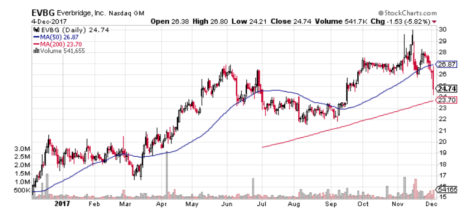Protecting People and Property is Lucrative
Almost exactly one year ago, on December 2, I recommended that Cabot Small-Cap Confidential subscribers buy an emerging small-cap cloud software stock.
It’s worked out quite well.
The stock has risen by 60% over the past 12 months, outperforming the Russell 2000 Index by 43%, and beating the S&P 500 by 40%.
I thought sharing the reasons why I recommended it, what the company does, how we’ve managed the stock over the past year, and what our plan for it is moving forward (especially in light of tech stock volatility), could help you better manage your small cap stock holdings.
First, why did I recommend it?
Three reasons.
One, it’s a rapid-growth small-cap cloud software stock with a great business model. I love the subscription software business model because it tends to be scalable, revenue growth is relatively stable, and these types of businesses make terrific M&A targets. Plus, cloud software stocks tend to enjoy fat gross profit margins so once they gain enough scale they often grow earnings rapidly, throw off good cash flow, and operate with very little debt.
[text_ad]
Second, the company is in an intriguing market that’s of significant size (roughly $40 billion), and which isn’t well-known by the investment community. That suggests long-term growth.
Third, the company had attractive fundamentals. When I recommended it a year ago, the company had just completed two years of 35%+ revenue growth (41% in 2014 and by 38% in 2015), and was on pace to grow revenue above 30% in 2016. It wasn’t profitable (EPS loss in 2015 was $-0.29), but was moving in the right direction. And it was introducing new software modules that were expanding its target market size. Customer retention was around 90%.
Lastly, the chart looked good, the company wasn’t well-known, it appeared to have 100% upside potential over the next two years and, generally speaking, small-cap cloud software stocks were doing well.
What’s the company, and what exactly does it do?
Play the Cloud Software Stock Trend with Everbridge (EVBG)
The company is Everbridge (EVBG). It’s in the business of protecting people and property. Unfortunately, this is a growing market given the prevalence of natural disasters, cybersecurity attacks and terrorist acts. But fortunately, technology can play a role in reducing injuries, anxiety and property damage. And this company has the most advanced set of solutions on the market.
It has helped protect millions of people from hurricanes, tornadoes, earthquakes, and active shooter situations. When a child goes missing, it’s there to help. When an armed suspect is running free in the streets, the community can use its solutions to help law enforcement make the arrest.
This is how I described it to Cabot Small-Cap Confidential subscribers on December 2, 2016:
“It was founded in 2002, shortly after the 9/11 attacks, to provide fast, automated communications services during life threatening situations and mission-critical business events. The software platform powers apps that help organizations and government entities keep people safe and business running. Customers buy the software to lower the risks to human life and the cost of business downtime due to terrorist attacks, active shooter situations, severe weather events, IT outages and cyber-attacks.
“The company’s SaaS-based technology quickly collects, aggregates and analyzes data that can help customers asses the level of the threat, locate people at risk, deploy resources to help, and execute pre-defined communications processes. The platform can deliver contextual messages via voice, text and email, to millions of recipients in over 15 languages, on over 100 types of devices, in over 200 countries, all at the same time. And it can receive return information on a person or device’s status so that organizations can respond properly.
“The system prompts receivers to use short, simple responses to questions like “Are you safe?” or “Do you need medical help?” Over the last 12 months, Everbridge has sent out 1.4 billion tailored messages. The Burlington, Massachusetts-based company has a market cap of $420 million, and just went public on September 16, 2016.
“Everbridge started with one product, a mass notification solution that it tweaked and expanded for the first 10 years of the company’s existence. That solution helped it grow a customer base to 867 by the end of 2011. Since then, it’s developed six additional solutions and has grown its customer base to over 3,000 enterprise customers, spanning the corporate, healthcare, transportation, higher education, energy and governmental and financial sectors.
“Today’s clients include eight of the 10 largest U.S. cities, eight of the 10 largest U.S. based investment banks, 24 of the 25 busiest North American airports, six of the 10 largest global consulting firms, six of the 10 largest global auto makers, all four of the largest global accounting firms, four of the 10 largest U.S. based health care providers and four of the 10 largest U.S. based health insurers. The average number of products per customer is around 2, and growing.”
Is Everbridge Still a Buy?
Since I wrote that, shares of Everbridge have risen by 60%. Prior to the recent selloff in tech stocks, the stock was trading near 26, which represented a 67% gain, and its 52-week high of 30 (hit in early November) represented a roughly 93% gain from our cost basis.
Right now, shares are trading just below 25, which puts them below their 50-day line, and just above their 200-day line.
Will we continue to hold the stock?
For now, yes. We took partial profits in the stock at 23.6 in June when tech stocks began to get shaky. But I moved the stock back to Buy recently because growth is reaccelerating (revenue growth should hit 35% this year), the company is signing more significant deals, and new solutions (especially in safety and security) are gaining momentum. It now has over 3,300 customers, eight enterprise applications, and is adjusted-EBITDA positive. Everbridge has also recently issued convertible debt that will allow it to accelerate its overseas expansion agenda.
After the company reported Q3 results on November 6, I sent the following Special Bulletin to Cabot Small-Cap Confidential subscribers:
“Everbridge reported after the bell yesterday. It might have been its best quarter yet as a public company. Revenue was up 37% (versus expectations of up 32.5%) and EPS of -$0.02 beat by $0.04. Even better, guidance was raised more than the beat, and management now expects 2017 revenue growth of 35% (versus 30.5%).
“Notable things from the quarter included solid momentum selling non-mass notification products (shows ability to introduce new solutions, which grows the addressable market), larger deal sizes (more than 10 deals valued over $100,000), and a 16% increase in new customers. Management talked at some length about how it has only landed a handful of sizable state/district deals (New York, Florida, Washington DC), and now it should be much easier for others to jump on the bandwagon. It also discussed how market demand is growing given the number of unfortunate events in recent months.
“Analysts on that call seemed genuinely surprised at the uptick in business momentum. There were several that kept rephrasing the basic question, “What’s changed that’s caused growth to accelerate?” Management was pretty straightforward, saying it’s just a matter of having the right products to meet the market’s needs, and that’s attracting state, local, federal and private-sector interest. It also pointed out that it’s really only three deep into the state market, and when you add large counties, states and cities to the list, there are roughly 200 sizable opportunities out there … I’m sticking with a Buy rating.”
Since I wrote that, tech stocks, including Everbridge, have pulled back. The reason appears to be that investors are rotating out of stocks with relatively low effective tax rates (including cloud software stocks) and into those with relatively high effective tax rates. The catalyst, of course, is that the House and Senate appear to be pushing a tax reform bill to Congress.
Given that this rotation isn’t due to stock-specific reasons, and that a lower effective tax rate is still a net positive for cloud software stocks (it should translate into higher EPS growth) I still think shares will be trading significantly higher a year from now. There could be some more weakness and volatility over the next couple of months as specifics of the tax reform plan become more apparent. But that can be handled by position sizing and stop loss discipline, and, in my opinion, isn’t reason to steer clear of rapid growth cloud software stocks, including Everbridge.
Everbridge is the kind of stock I’m looking for every day. And it’s just one of many cloud software stocks I cover in Cabot Small-Cap Confidential. If you’re interested in gaining access to my research, including buy and sell price targets, consider becoming a regular subscriber. Even with this recent pullback, our stocks are still beating their benchmark by an average of 19%!
To learn how to become a subscriber, click here.
[author_ad]


